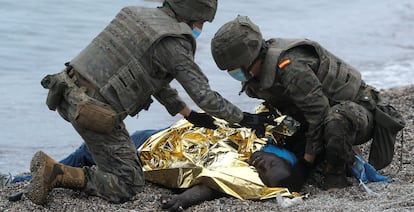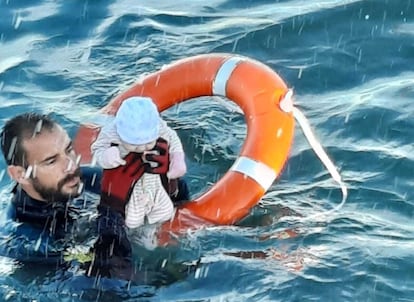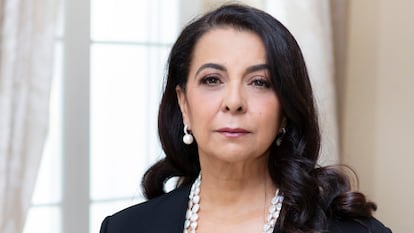Spanish PM vows to protect borders ‘with all necessary measures’ after thousands of migrants swim to Ceuta
The government is gravely concerned about the unexpected breaches in North Africa these past two days, but for now is opting to take a highly cautious diplomatic approach toward Morocco

The dramatic arrival of thousands of irregular migrants from Morocco on Spanish shores has put the government of Prime Minister Pedro Sánchez on high alert. The Socialist Party (PSOE) leader canceled a trip to Paris on Tuesday and flew down to Ceuta, after having stated earlier in the day that “territorial integrity” would be defended after more than 7,000 people swam to the North African Spanish city from Morocco between Monday and Tuesday.
Speaking today at a news conference in La Moncloa prime ministerial palace, Sánchez opened the door to using any means necessary to guarantee the security of the country’s borders, as well as promising that the integrity of Spain’s territory was not at risk.
Sánchez did not play down the severity of what he described as an “unheard of” crisis in Ceuta, and which also affected Spain’s other North African city of Melilla, albeit to a much lesser extent. But he did refrain from directly attacking Morocco, instead calling for the country to resolve the crisis like good neighbors “out of respect for territorial integrity.”

“The territorial integrity of the borders of Ceuta and Melilla,” he said, “which are also EU borders, will be defended at all moments by the Spanish government, under any circumstance and with all of the necessary measures.” His tone suggested that this was a much more serious incident than the many immigration crises that Spain has had to deal with over recent years.
Thousands of people began to illegally arrive in Ceuta on Monday, swimming from the neighboring city of Fnideq, which is on the border of the breakwater that demarks the exclave city from Morocco. Other migrants used rudimentary swimming boards to make it to Spain from the Moroccan city, also known as Castillejos, and which is home to around 7,000 people.
The migrants entered via Tarajal beach and the area of Benzú. One person died in the crossing. Moroccan authorities made no effort to stop the wave of arrivals and the Moroccan government remained silent on the issue on Monday.
The situation in North Africa comes after weeks of rising tensions between Morocco and Spain. The diplomatic row began in April when Moroccan intelligence services found out that Brahim Gali, the 73-year-old founder of the Popular Front for the Liberation of Saguia el-Hamra and Río de Oro (Polisario Front), had been admitted under a false name to a hospital in the Spanish city of Logroño when he was suffering from Covid-19. The Polisario Front is a liberation movement by the Sahrawi people and is outlawed in the parts of Western Sahara under Moroccan control.
Spanish Interior Minister Fernando Grande-Marlaska defended the move, requested by Algeria, “for strictly humanitarian reasons.” The Moroccan Foreign Affairs Ministry, however, lambasted the decision, calling it an affront to the spirit of “association and good neighborliness,” and threatened Spain with reprisals.
Speaking on the state broadcaster TVE on Tuesday morning, Grande-Marlaska said that the migrants “are people who entered Spain illegally. We must prevent or else return these people due to their illegal entry.”
Tenemos un trabajo de prevención importante.
— PSOE (@PSOE) May 18, 2021
Son personas que han entrado de forma ilegal a España, debemos prevenir o bien devolver a estas personas por entrada ilegal.
📺 Fernando Grande-Marlaska en @LaHoraTVE #LaEspañaQueHacemos_ pic.twitter.com/i9upaKbZMY
The Spanish government was on Tuesday unwilling to publicly speak about the causes of the crisis, and refused to link Morocco’s actions to the situation involving Brahim Gali. But the fact that this key ally, to which Sánchez has paid special attention, is allowing thousands of young men and adolescents to swim into Ceuta has the executive deeply concerned.
Since Monday, Sánchez has been engaging in all kinds of diplomatic maneuvers to pressure Morocco and convince them to stem the wave of immigrants that were surrounding the border fence in Ceuta on Tuesday and threatening to breach it at any moment. The prime minister also spoke to the European Union’s High Representative for Foreign Affairs and Security Policy, Josep Borrell, as well as the European Council president, Charles Michel.
The president of the European Commission, Ursula von der Leyen, voiced her “solidarity” with Spain on Tuesday in a message posted on Twitter. “Europe expresses its solidarity with Ceuta and Spain,” she wrote. “We need common European solutions to manage migration.”
Sánchez also spoke with the Spanish king, Felipe VI, and with opposition Popular Party (PP) leader Pablo Casado, a reflection of the severity of the crisis. Via a statement from the PP, Casado adopted a measured tone and avoided criticizing Sánchez directly for the chain of events. The PP called on the prime minister to normalize the situation and guarantee territorial integrity. The conservative party is in power in Ceuta, and its premier, Juan Jesús Vivas, is in permanent contact with Casado and has also spoken to Sánchez.
There is particular concern in La Moncloa over the actions of the far-right Vox party, which is the third-largest group in the Congress of Deputies and has also made great gains in recent years in regional and local administrations. The group is using the images of the migrants to share messages speaking about an “invasion” and accompanied by other xenophobic claims.

In response, government spokesperson María Jesús Montero said that the executive “wants to convey a clear and resounding message against xenophobic messages that criminalize immigrants. The last thing we need to do is fan flames of hate and fear. We are calling for responsible behavior.”
For his part, Grande-Marlaska explained on Tuesday that Spain is rapidly moving to return some of the immigrants who entered Ceuta, but the situation was far from under control and the images that were being broadcast on Spanish television on Monday and Tuesday had the Cabinet very concerned.
Sources from the Spanish government – a coalition of the PSOE and junior partner Unidas Podemos – explained on Tuesday that Morocco is going through a very difficult economic situation due to the pandemic, something that has prompted more migrant arrivals from the country in the Canary Islands in recent months, for example. But this latest crisis in Ceuta – which has a population of just under 85,000 people – was completely unexpected.
Before the founder of the Podemos party, Pablo Iglesias, left his role as deputy prime minister – subsequently leaving politics altogether – the left-wing politician had called for a referendum on the issue of Western Sahara. These words did not go down well in Morocco, but the situation was soon smoothed over by a different approach from the PSOE members of the coalition government.
Links to Gaza
However, the situation soon spun out of control once the country took the decision to take in the leader of the Polisario Front. That said, the imbalance between a humanitarian decision to treat someone who was sick and allowing thousands of youngsters to risk their lives at sea is also of great concern to the Spanish government, which on Tuesday was opting to avoid publicly linking the two incidents.
The ongoing crisis in Gaza could also have had an effect, government sources said, because the decision by Morocco to establish relations with Israel in exchange for the United States recognizing the former’s sovereignty over Western Sahara is controversial at home at a time when Israel is bombing the Gaza Strip – something that is causing anger among the Moroccan population.
Whatever the case, the strongest hypothesis as to why this has happened is linked to Brahim Gali. On Tuesday, the Spanish government was trusting that international pressure, in particular from the EU, would see Morocco shift course. But if not, Sánchez made clear that he would do whatever is needed to protect the border.
Spain summons Moroccan ambassador

The ambassador to Morocco in Spain, Karima Benyaich (pictured), said on Tuesday that there are actions that have consequences when it comes to relationships between countries, “and they must be accepted.”
This could be interpreted as a veiled reference to Spain offering humanitarian treatment to Brahim Gali and her country’s possible response by allowing thousands of migrants to swim for Spanish shores. Benyaich was summoned by the Spanish foreign minister on Tuesday in the wake of the crisis in Ceuta.
Speaking to the Europa Press news agency, the ambassador insisted that there are “attitudes that can’t be accepted” adding that relations between neighboring countries must be based on “mutual trust, which has to be worked on and nourished.”
English version by Simon Hunter.
Tu suscripción se está usando en otro dispositivo
¿Quieres añadir otro usuario a tu suscripción?
Si continúas leyendo en este dispositivo, no se podrá leer en el otro.
FlechaTu suscripción se está usando en otro dispositivo y solo puedes acceder a EL PAÍS desde un dispositivo a la vez.
Si quieres compartir tu cuenta, cambia tu suscripción a la modalidad Premium, así podrás añadir otro usuario. Cada uno accederá con su propia cuenta de email, lo que os permitirá personalizar vuestra experiencia en EL PAÍS.
¿Tienes una suscripción de empresa? Accede aquí para contratar más cuentas.
En el caso de no saber quién está usando tu cuenta, te recomendamos cambiar tu contraseña aquí.
Si decides continuar compartiendo tu cuenta, este mensaje se mostrará en tu dispositivo y en el de la otra persona que está usando tu cuenta de forma indefinida, afectando a tu experiencia de lectura. Puedes consultar aquí los términos y condiciones de la suscripción digital.








































